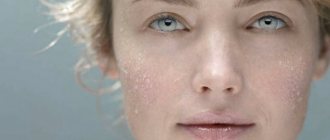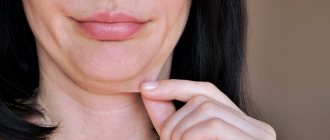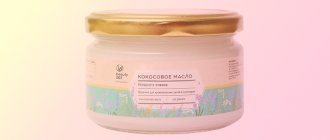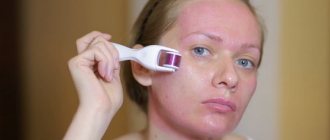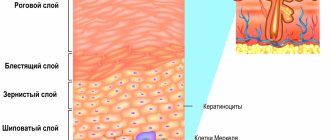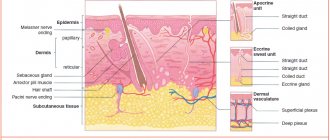According to statistics, the most common skin types are combination and dry. Moreover, about 40% of clients of dermatological clinics suffer from dryness. As a rule, moisturizers, masks, serums and other cosmetics help cope with it. However, if the skin is severely dehydrated, it requires additional care. Together with cosmetologist Elena Gretsova
Let's figure out how to recognize skin dehydration and what to do about it.
What are the features of the “Russian” type of aging and how to avoid it
Signs of dehydrated skin
Special care may be needed if you notice the following signs:
- Feeling of dryness and tightness
- especially after washing with water. - Dull and gray complexion
- when dehydrated, the skin is poorly renewed and loses its usual shade. - Oily shine
- the skin flakes and itches. - Fine wrinkles
- usually appear in areas with active facial expression, such as the forehead or around the eyes. - Increased sensitivity
- even familiar products cause irritation. - One layer of moisturizer is not enough
- the product is quickly absorbed, and the skin requires additional hydration. - Foundation doesn't last well
.
Photo: istockphoto.com
Elena:
The main causes of dehydration are natural age-related processes that begin after 25 years, and excess ultraviolet radiation. Internal diseases, bad habits and poor nutrition are also considered aggravating factors.
On the way to perfect skin. List of products that will help get rid of acne
BeautyHow to care for dehydrated skin
Text: Adel Miftakhova
Dehydration is one of the most common skin problems. Even those who have not experienced it (lucky people!) have probably heard how much skin tightness, dryness and fine wrinkles ruin people’s lives. At the same time, it is not so easy to independently understand the causes of dehydration and return the skin to a comfortable level of moisture: dehydrated skin is often confused with dry skin and they try to eliminate the problem by drinking large amounts of water, but this does not help. The author of the Don't Touch My Face Telegram channel, Adel Miftakhova, tells how to understand that your skin is suffering from a lack of hydration, eliminate the reasons that led to this, and restore the skin with care products.
How to tell if your skin is dehydrated
Dehydration is one of the most common skin conditions, but even reputable publications often confuse it with dryness. However, dryness and dehydration have different causes, and while they may feel similar, the key difference between them is that dry skin lacks natural oil, while dehydrated skin lacks water.
Dry skin, like oily or normal, are skin types that characterize its permanent properties. How much oil the skin produces depends mainly on heredity and genes, and to some extent on age and nutrition. This means that if you have dry skin, then most likely it will last for a long time, and it is almost impossible to influence it. Dehydration is a temporary (and correctable) condition in which the skin loses too much water, which can be caused by both external and internal factors. At the same time, any type of skin can be dehydrated - from extremely dry to very oily. If you live in a big city and do not adhere to a strictly healthy lifestyle, then this article is most likely about you.
Almost all owners of oily and combination skin are familiar with the situation when, despite the obvious oily sheen of the face, during the day you still feel dryness and tightness, and sometimes there is flaking. And this is perhaps the most obvious sign that the skin is dehydrated. Due to the fact that it lacks water, moisturizers are absorbed instantly, and foundations roll off and become noticeable by the middle of the day. This happens because the skin absorbs all the water from the foundation and only the pigment remains on the surface. Dehydrated skin of any type looks gray, dull, and has many small fine wrinkles on its surface, which are easily smoothed out thanks to hydration. Typically, dehydration is most noticeable on the forehead, cheeks and around the eyes.
What leads to dehydration
There are several reasons why our skin loses moisture, and although internal factors are also present, external factors play a larger role. On the surface of our skin there is a protective lipid layer that retains water in it. Often, dehydration is the result of a weakening of this protective layer: as a result, the evaporation of water from the skin increases (in dermatology, this process is called transepidermal water loss, or TEWL). On the one hand, dry skin is more prone to dehydration, since by default it produces less sebum, which protects against water loss, but on the other hand, oily and problematic skin is usually cleansed with aggressive products that completely deprive the epidermis of both water and the natural barrier.
Another common cause is weather and dry air. So, in winter, when the heating is at full power, air humidity tends to zero, and this invariably affects the condition of the skin. In summer, radiators and heaters are replaced by air conditioners. In dry air, the skin loses a large amount of water due to evaporation and becomes like oiled paper to the touch. Prolonged exposure to the sun also activates the evaporation of water from the skin - and this is another reason, among many others, why you should not stay in direct sunlight for long periods of time.
Will drinking a lot of water help?
Coping with skin dehydration and making it smooth and radiant is not difficult, and cosmetics in this case play perhaps the most important role. Ideally, you need to start solving any skin problems by eliminating internal causes, but since dehydration is largely caused by external factors, then acting directly on the surface of the skin will help get rid of it.
In recent years, advice has been heard from all irons - drink enough water. Indeed, it may seem that if you drink more, it will help the skin restore its water balance and solve the problem of dehydration. In fact, there have been very few studies examining the dependence of the amount of water in the skin on the amount of water drunk, and none of them have proven that a direct connection exists. Water is good for the body, but the skin needs external hydration. Thus, the problem of dry indoor air is easily solved with the help of humidifiers. Humid air will allow the skin to evaporate less water and, as a result, maintain its level of moisture.
You can also reduce water loss by following a diet. Smoking, alcohol and sugar all contribute to the complex aging process, which also involves dehydration. We will not advise you to completely give up wine and desserts, but we will remind you that everything is good in moderation and it is better to consume them in reasonable quantities.
How to properly care for dehydrated skin
When caring for dehydrated skin, the main thing is not to overdo it. Considering that the lipid layer is almost the main obstacle that prevents the skin from losing moisture, we recommend paying attention to gentle products that do not contain aggressive surfactants and alcohol. They certainly damage the protective layer, but not to the same extent as foam cleansers with sulfates. For example, CeraVe Hydrating Cleanser is a simple yet effective sulfate-free cleanser. By itself, it, of course, does not moisturize, but it also does not dry out and is perfect even for oily skin. Or Clinique Take The Day Off hydrophilic cleansing balm based on safflower oil - it does not leave a film on the skin and perfectly removes makeup and impurities.
It's also important to remember to exfoliate - it helps remove dead cells from the skin's surface so that moisturizers can better penetrate the skin and work more effectively. ANA acids in low concentration, in addition to exfoliating properties, can also retain water in the skin, which is never superfluous. When choosing exfoliating products, it is also better to choose mild ones that do not contain alcohol, since there are a great many of these on the market now. Our favorite is the Clarins Gentle Exfoliator acid toner, it is suitable for owners of any skin type: it renews, adds radiance and eliminates flaking.
Layering moisturizers works great to combat dehydrated skin of any type. LabMuffin blog author Michelle Wong writes about this in an accessible and interesting way. First of all, after cleansing (and optionally exfoliating), you should apply a water-based product containing moisturizing ingredients, such as glycerin or hyaluronic acid. Most often they are produced in the form of serums and are suitable for any skin type, since even the oiliest and most problematic skin needs hydration. Such products replenish the lack of water in the skin and instantly give a pleasant feeling of hydration. Look for packaging that says “moisture,” “hydrating,” or “dehydrated.” Water-based products are best applied to skin that is still damp after washing or applying toner to ensure maximum hydration.
Pay attention to the light emulsion Holika Holika 3 Seconds Starter with hyaluronic acid or the Caudalie Vinosource SOS Thirst Quenching Serum, which instantly moisturizes the skin, removes flaking in just a couple of days, and most importantly, is quickly absorbed and is not felt at all on the face. Not a budget option at all - Chanel Hydra Beauty Micro Serum is a luxurious serum that works great both in combination with the rest of the Hydra Beauty series and on its own.
Light, watery products are quickly absorbed and instantly moisturize the skin, and it is important to maintain this effect for as long as possible. To retain water in the skin, immediately after the moisturizing serum, you should apply a cream containing oil (that is, almost any). At night and with very dry skin, you can even use special facial oils. In this case, they will act as an analogue of the natural lipid layer and will not allow moisture to evaporate. Silicones are also a good water-retaining component.
Take a closer look at the Estée Lauder DayWear line - it contains products for all skin types, with a pleasant texture and sun filters. If your skin is prone to oily skin, we recommend Bliss Drench'n'Quench moisturizing cream: it does not provoke additional shine, and upon application it turns into water. Well, the heavy artillery is the night serum in oil for all skin types, The Body Shop Vitamin E Serum-In-Oil. It helps transform the skin, make it soft, elastic and does not provoke additional oiliness.
Photos: Chanel, yiucheung - stock.adobe.com, lercanon550d - stock.adobe.com, Andrey Kuzmin - stock.adobe.com
How to distinguish dehydrated skin from dry?
The terms “dehydrated” and “dry” are often used interchangeably. In fact, these are different phenomena.
As a dermatologist explains, dry skin
- this is a certain type. It is characterized by a feeling of tightness, peeling, and increased sensitivity. With dry skin, the level of damage is in the uppermost layer - the epidermis. It weakens the lipid barrier, and as a result, increases moisture loss.
Photo: istockphoto.com
Dehydration
is a condition that can occur in absolutely any skin type. In this case, the source of damage is located deeper - in the dermal layer. Externally, dehydration manifests itself in decreased tone, loss of elasticity, the appearance of wrinkles and a dull complexion. The reason for these changes is a decrease in the amount of collagen, elastin and hyaluronic acid in the skin.
Vitamin minimum: what important substances we can’t do without
Causes of skin dehydration
Contrary to popular belief, it's not just dry skin that can be dehydrated.
Let's look at the main reasons for this problem:
- insufficient fluid intake;
- poor nutrition;
- improper skin care and insufficient hydration;
- metabolic disorders;
- excessive sweating;
- some systemic disorders;
- exposure to ultraviolet radiation, frosty air, wind or other adverse natural factors;
- long-term use of a number of medications (for example, diuretics).
What to do if your skin is dehydrated?
Dehydration is a temporary skin condition that can be corrected.
You should start by restoring your water balance - drink more fluids, mainly pure mineral water. This will not only improve the condition of the skin, but will also have a beneficial effect on the body as a whole.
Photo: istockphoto.com
The second step will be “external” hydration - with the help of creams, serums, face masks and other cosmetics. They need to be used regularly. They will help retain moisture and prevent dehydration. At the same time, you should choose products for washing that do not dry out the skin.
However, these steps are not always enough to achieve complete recovery.
Elena:
With dehydration, the damage is deeper than the surface layer, so more radical measures are necessary. Hardware procedures that stimulate the synthesis of collagen and hyaluronic acid are very effective (for example, photorejuvenation, radiofrequency lifting, non-injection mesotherapy), as well as injections of hyaluronic acid and vitamin cocktails (biorevitalization, mesotherapy). Using cosmetics alone will not solve the problem of dehydration.
How to slow down skin aging? Healthy habits will help you stay young
Home care rules: a reminder for the client
- Eliminate foaming products from your daily care routine. They contain surfactants that change the pH of the skin to the alkaline side. This leads to a change in the hydrolipid barrier and loss of moisture.
- Cleanse the skin with delicate products - creams, milk, balms and light gels.
- Use a mild, non-alcohol-based toner to soothe the skin and normalize its pH after washing. We recommend Flower Lifting-Toner - it refreshes, moisturizes and has an anti-inflammatory effect.
- Avoid thick moisturizing products that clog enlarged pores. Advise you to use light products - creams, serums, emulsions or fluids. A good option is cosmetics with peptides that stimulate regeneration and strengthening of the skin, for example, multi-face cream with peptides and the antioxidant complex Multi-Action Peptide Cream. The product contains urea and niacinamide.
- Do light peeling 1-2 times a week. An exfoliant paste with enzymes will delicately remove dead cells without drying out the skin.
- Review your diet: drink enough water and eat more foods with omega-3 fatty acids and vitamins A, E, B6 and C. The menu must include fish, olive or vegetable oil, fresh vegetables and fruits.
Stop lights for dehydrated skin
If your skin is dehydrated, you should avoid washing with soap, harsh scrubs and clay masks. You should also temporarily refrain from contrast showers and going to the bathhouse.
In addition, it is extremely important to choose the right care products. The dermatologist recommends avoiding cosmetics that contain “irritating” ingredients, such as alcohols and aggressive surfactants (surfactants).
How to achieve a beautiful shade without harming the skin? Safe tanning rules
Also, do not neglect sunscreens - they have a preventative effect and will help prevent dehydration.
Clinical researches
Clinical studies have proven the effectiveness, safety and tolerability of the products. The products are suitable for daily care, including for children's skin with mild and moderate forms of atopic dermatitis during remission. As a result of using the products, a decrease in the activity of inflammation, dryness, itching and flaking was noted.
Sources:
- Mancini A.J., Krouchuk D.P., Pediatric dermatology. Practical medicine, Directory, 2018
- Chapman M. Shane, Habiff Thomas P., Zug Catherine A., Dinoulos James G. H., Campbell James L., Dermatology. Handbook of differential diagnosis, MEDpress-inform, 2014
- Reken Martin, Schaller Martin, Sattler Elke, Burgdorf Walter, Atlas of Dermatology, MEDpress-inform, 2018
Procedure "Skin restoration"
Maintains a healthy appearance of the skin for a long time, slows down the processes of premature aging. Improves the appearance of the face, restores water-lipid balance, cleanses, tones, moisturizes and nourishes the skin. Helps mitigate the negative effects on the skin of frequent flights, visits to the pool and staying in an air-conditioned room. Suitable for sensitive skin. “SOS procedure” Indications: “Tired”, dehydrated skin
Treatments "Ultra Ceuticals"
| Procedure name | Prices |
| “Brightening treatment” 45 min | 6000 |
| Cleansing problem skin 60 min | 4500 |
| Peeling based on 30% lactic acid 30 min | 4000 |
| Express care “Skin restoration” 45 min | 4500 |
| Express care “Skin Energy” 45 min | 4500 |
Features of yellow peeling
The main feature of the peeling is its unusual composition, the main component of which is retinoids. This is the name for vitamin A analogues that have an active effect. In this case, protein destruction and skin damage do not occur. Retinoids have a positive effect on the dermis. They help accelerate the process of cell division, activate the synthesis of hyaluronic acid, collagen and elastin, and promote the secretion of sebum. Additionally, melanin production is verbalized and the number of damaged cells decreases. As a result, signs of age-related changes are noticeably reduced, and the skin texture becomes better. You may also notice that hyperpigmentation disappears.
The procedure is recommended in the following cases:
- there is a lack of collagen production;
- there are signs of photoaging;
- decreased elasticity and firmness of the skin;
- acne or hyperpigmentation is present;
- there is hyperkeratosis.
The procedure should be abandoned if you have an allergic reaction to one of the components of the product. It is also recommended to discontinue it in case of infections, dermatological diseases, photosensitivity, and the presence of warts. It is strictly forbidden to use this method during pregnancy and lactation, since retinoids are embryotoxic.
